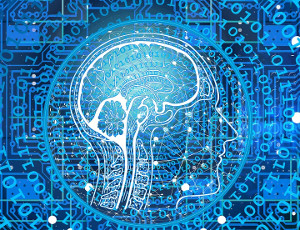
Prof. Jacek Tabor from the Faculty of Mathematics and Computer Science, along with his colleagues Prof. Maciej Nowak from the Faculty of Physics, Astronomy and Applied Computer Science and Prof. Tadeusz Marek from the Faculty of Management and Social Communication, have received a 4.5 million euro grant from the Foundation for Polish Science. Their interdisciplinary team will work on a project entitled Biologically inspired artificial neural networks.
Artificial intelligence and its possible applications is an increasingly captivating subject in modern culture. Scientists have been working on AI since the 1950s, taking inspiration from neurons – nerve cells that are able to store, aggregate, and transfer information. Although throughout the course of their research they started moving away from attempting to imitate neurons, the recent years saw a great comeback to this idea. The difference is, scientists no longer focus on single neurons, instead creating large neural networks, similar to those found in human eyes or brains. ‘In computer science, neural networks are systems that function similarly to our brains. We’re gradually able to learn more and more about how they work, and so we can apply that knowledge to design better AI, eliminating many obstacles and limitations that we previously faced in traditional machine learning’, Prof. Tabor said.
Some of those obstacles include the time and resources that need to be spent in order for a machine to learn its task, e.g. cataloguing photographs. ‘A person can usually learn to correctly classify images (such as X-ray photos) by looking at a few dozen of them. A computer needs about a million. It’s a vast difference and a serious problem, since sometimes there’s just not that much data available at hand. Naturally, when AI finally learns to catalogue photographs, it more often than not becomes much more efficient and effective than a person. But the biggest issue is teaching it how to do it’, Prof. Tabor explained.
The process of machine learning is so lengthy because of its complexity. While the human brain simplifies the data it receives and selects only what is relevant, AI meticulously analyses even the tiniest bit of information. Another problem is its susceptibility to errors. A person will immediately recognise and reject a picture of cat from a set of X-ray photos, while a computer will study it just as carefully as if it was an X-ray of a hand.
‘Because of that, AI specialists from around the world are again seeking inspiration in the cognitive processes occurring in the human brain. Our research is an example of that trend. We seek to create neural networks that will serve local entrepreneurships, like businesses or start-ups’, Prof. Tabor added. And the potential for the use of AI is limitless. Even now, it is used in voice recognition software, translation, and image processing. It is estimated that in the near future it will be employed in precise medical diagnostics, self-driving cars, and to help forensic scientists analyse evidence and identify people.
The TEAM-NET programme is realised by the Foundation for Polish Science and funded by the European Regional Development Fund (ERDF). It provides funding for interdisciplinary research projects carried out by a network of collaborating teams led by experienced scientists. The aim of the programme is to facilitate pursuing innovative research projects in Poland, encourage large-scale cooperation between scientific institutions, and promoting Polish research infrastructure.





